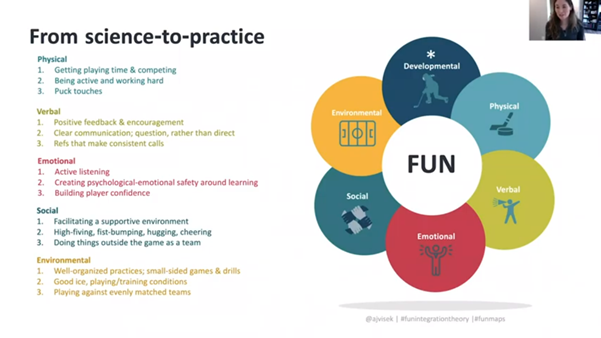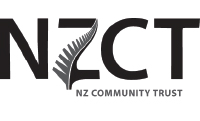What is Fun?
8 May 2023

Insights from research tell us that participation rates in sport drop off in the teenage years.
To address this, we often hear that the focus should be on fun, not the score or winning. This is often interpreted as letting the kids goof around without specifics on what ‘fun’ is. For many adults, that’s not what you want and according to Dr Amanda Visek’s The Fun Integration Theory, that’s not what the kids want either.
To support you in understanding what fun really means for kids playing sport, Nuku Ora Community Development Manager, Kirsten Kilmister, has summarised some key concepts from Dr Visek’s theory alongside some insights and results found in the Future of Rangatahi Sport in NZ research.
Fun is the #1 reason kids play sport, and keep playing sport, it fuels their motivation to participate, but according to Visek’s research there are 81 different determinants as to what “fun” actually means. The top five determinants are:
- Trying hard
- Positive team dynamics
- Positive coaching
- Learning and improving
- Playing games
Google Amanda Viskek Fun Maps and you’ll find tonnes of information on this, including some great videos which zoom in on each of the data points to explain exactly what it means, for example, some of the elements that make up “Positive Coaching” are:
- A coach that you can easily talk to
- A nice, friendly coach
- Having a coach that is a positive role model
- A coach who allows mistakes, while staying positive
- When a coach treats players with respect
The great thing about this information is that it provides a guide as to what tamariki and rangatahi are looking for when they say they want to have fun. The maps provide you with tangible things that you can do, things that are within your control to help create a fun experience and which will ultimately retain kids in sport.
Interestingly, Visek says that for the fun determinants, there are no differences between:
- boys and girls
- older kids and younger kids
- competitive athletes and recreational players
You may have also seen the series of articles that we’ve been publishing based on results from the ‘Future of Rangatahi Sport in NZ’ 2022 research. In our first article “What do rangatahi want from sport?” we discussed fun and the following three points:
- Fun
Sport in the early years is all about having fun and working together as a team. There is little expectation (inwardly and outwardly) of anything but having fun.
35% of rangatahi associate ‘fun’ with sport in general but the pressure to perform increases as they get older. When you’re delivering sport, keep in mind that they want to:
- enjoy themselves,
- hang out with their teammates,
- emulate their sporting heroes,
- have supportive encouragement from adults on the sidelines.
If this is missing, to find joy and fun in sport again, rangatahi look for other activities to engage in with their friends, e.g. joining social leagues and playing non-traditional sports which might not have the same levels of pressure or bad sideline behaviour.
2. Connections
Forming connections and having the opportunity to bond and get to know each other better is important to rangatahi participation. Whether it’s spending time with friends or building relationships with teammates, many join sports teams to make friends and form social connections. If this element is missing, the sport quickly becomes a way to pass the time, and interest in the activity fades.
If this element is missing from their current experience, some rangatahi are making their own teams with friends, however, the drive to make their own team based on friendships is the exception – many will drop out completely and won't take the initiative to form their own team if a sense of connection is missing.
As organisers of sport, take into consideration:
- The team turns up to games together
- Having after-game celebrations
- Making time for the team to hang out together outside of the sport - or before training
- Having whānau/family get-togethers e.g. at the start and end of the season to form wider connections and support networks
3. Progression
Almost all the young people we spoke with as part of the research talked about wanting to feel a sense of progression – a sense of 'getting something out of playing sport' and development.
While the team element is important, rangatahi think about progression and achievement on an individual basis, (meaning that it will vary from person to person, so you need to ask them questions on an individual basis).
- Progression can be about improving skills, but it can also be as simple as wanting to get fit.
- One of the consistent messages rangatahi talked about is wanting to be acknowledged by their coach as an individual and to feel like their coach understands and works on their individual strengths and weaknesses.
- Rangatahi want to feel a sense of achievement.
- Celebrating small, personal milestones is important.
To see the full findings from the ‘Future of Rangatahi Sport in NZ’ click here and scroll down the page to the Additional Resources section.
Back to Visek’s Fun Integration Theory, the image is an example from ice hockey showing how to create a fun experience by putting the determinants into practice.
Watch this USA Hockey video for the full explanation.
If you hadn’t already heard about Dr Amanda Visek’s Fun Maps or the Fun Integration Theory, hopefully, this article prompts you to look into it, watch the video, and think about what you can do at your next practice or within your club to make your sport ‘fun’. It will make a difference to retention and as you’ve read, it doesn’t just mean joking around – and if you’re unsure what to do, ask them what they’d like to do to make practices/participating in your sport enjoyable and fun.









